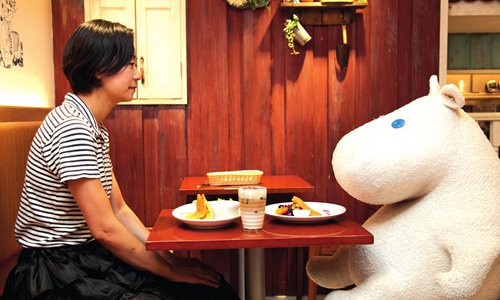
A woman taking a trip on her own (Photos: IC)
Li Ruixing, a 27-year-old freelance interpreter and translator in Beijing, shares a 70-square-meter apartment with two other roommates, and they seldom have conversations. Today, Li's best friend is a virtual frog in the Japanese mobile game Traveling Frog.
The frog travels to different places in Japan and brings home local products and sends home photos. The frog sets off on its own, and players do not know when it will go or come home. Li spent 50 yuan ($7.92) on the game and bought her frog all the expensive equipment needed for its travels. She said she has never spent money on a game before.
"I think the frog and I are very alike," she said. "It is independent, travels a lot, meets new friends and does whatever it likes during the journeys; it seems happy every day, although it is kind of lonely."
Li earns about 15,000 yuan per month, and she spends more than 10,000 yuan a month. She does not have a boyfriend or close friends in Beijing. As a result, most of her expenditure is invested in herself, including food, clothes, cosmetic products, tourism and entertainment. Of course, she spends money and enjoys herself alone.
According to a recent report by the Euromonitor International, a global market investing institution, the number of single Chinese ages 20 to 39, who are called "one-person families" and "empty-nest youth," have reached over 50 million. The report revealed that a new generation of Chinese consumers has stepped onto the stage. They are mostly well-educated, young and willing to spend money on themselves.
The sense of loneliness, which is common among Chinese single youth, is pushing forward a "lonely economy," and many social industries, including tourism and real estate, are influenced more and more by this new economy, the report explained.

A woman dining by herself
Comfort in the internet
In January, the workplace social app Maimai and xiaozhu.com, a short-term house renting website, jointly released a report on the lonely economy. They focused on over 10,000 single people born in the 1990s, 1980s and 1970s in China and studied their reasons for feeling lonely and their spending habits when feeling lonely.
According to the report, the lonely population's spending habits injected vigor into many industries related to the internet, like mobile games and live streaming, which are convenient entertainment outlets for single people to access anywhere at any time.
Liu Zhifeng, a 28-year-old IT worker, said he is most relaxed on the weekends when he can spend a whole day at home playing the mobile game King of Glory. He has spent more than 8,000 yuan on the game. Also, he is a fan of the recent hot computer game PlayerUnknown's Battleground, follows many live streamers on douyu.com and has spent 3,000 yuan on virtual gifts for them.
"What can a single man do when he is alone? The answer is games," he said. "I now like mobile games most because I am too lazy to sit still in front of the computer, like when I am at work. I prefer lying on my bed or sitting on a couch in a coffee house and playing, and even sometimes on the toilet."
Liu has been single for about two years. "I wanted to find a girlfriend, but I am too tired to get involved in a relationship," he said. "Rather than spending money and effort on a real relationship, I'd rather invest in gifts for female game anchors online who have the same hobby as me and give me sweet smiles after getting the gifts; it's simple and relaxing."
According to the report, empty-nest youth in China are mostly single and rent houses in large cities far away from their hometowns. Over 70 percent of the interviewees do not live in their hometowns, and about 10 percent are always on business trips. About 62 percent of the interviewees said they feel lonely, and 21 percent of the interviewees said they feel lonely every day.
On the analysis of the reasons that they feel lonely, the top five are being single, poor, lacking friends, frustration with their careers and being away from their hometowns.
Liu agreed with the reasons. "I don't have any savings, and I spend all the money I have every day. When I feel lonely, I go online to play games, and when I am upset and depressed, I buy some new games, which cheers me up every time."
The Maimai and xiaozhu.com report also revealed that about 57.7 percent of the interviewees spend money to kill their loneliness, and over 70 percent of the interviewees said they spend 1,000 to 5,000 yuan per month on items related to gaming, giving gifts to online live streamers and other entertainment outlets.
What they buy
Li seldom uses anything in her kitchen other than the microwave oven. She uses several food delivery apps such as Eleme and Meituan every day to eat.
"Only if you order every meal with apps can you be called an empty youth," Li said, adding that she commonly orders fast food on workdays and orders a big meal every weekend. "When I am alone, I don't want to cook. I don't have the energy, and I am not motivated."
According to Meituan's official website, 65 percent of its users are young people who live alone, and the sales of the company increased 44 percent in 2016.
Besides the Waimai industry, other industries like tourism and entertainment have changed gradually in China. According to Ctrip, the largest online tourism agency, in 2014, 8.3 percent of all its trips were solo trips, and in 2016, the proportion rose to 15 percent.
Li registered a trip last year on 54traveler.com, an online tourism agency that only serves travelers under 40 years old. She traveled to Chengdu and had a great time with 13 other travelers, among whom 11 were traveling alone.
Also, KTV, usually viewed as a group activity, has now become an individual entertainment since the introduction of mini-KTV booths. Liu said it is a very relaxing event, and he has experienced it several times.
"You can find mini-KTV booths in shopping centers, cinemas and airports in Beijing, and they are always equipped with air-conditioners, comfortable sofas and high-definition earphones," he said. "It offers soundproof walls and recordings of the songs you sing; I often felt embarrassed when going to KTV with my friends and worried that I might be off-key, but in the mini-KTV booth, I was relaxed."
According to the data released by imedia.cn, a Guangzhou-based consultancy company, there are at least 20,000 mini-KTV booths in the Chinese mainland. In 2017, the value of the mini-KTV booths reached 3.18 billion yuan, a 93 percent increase compared with that of 2016. Also, the company anticipates that the value will increase 120 percent to 7 billion in 2018.
Lonely but happy
Li went back to her hometown for Spring Festival, and many senior family members showed mercy to her and said, "Poor single girl, living alone in such a large city."
"Actually empty-nest youth are not that miserable. There are more and more things they can do by themselves, and with the population of empty-nest youth increasing, it will not be that weird to be alone all the time," Li said. "Don't say we are distressed and depressed, maybe we are lonely but free and happy."
A staff of xiaozhu.com said in the report that being lonely is not equal to being secluded from the world. The empty-nest youth actually are pursuing a high-quality life and spending more money on it. Also, they are seeking to socialize with other peers with common interests because surviving in a large city brings great pressure, which makes their sense of loneliness more intense. However, they choose to accept and make good use of loneliness by finding ways to kill it.
"Such behaviors will surely inject a new vigor into society," the staff said in the report.
Li said she would never be able to buy a house in Beijing on her own, but it is possible for her to rent a relatively good house.
"I will not save money, but I will spend it to increase my life quality," she said. "Now young people are not like our parents' generation, who saved money for life and sent it home. We now enjoy every day with every penny we get."
As a freelancer, Li said she spends most of her time at home and has gotten used to being alone. "Living alone, spending money alone, enjoying myself and investing in myself is not a bad way to live my life," she said.


